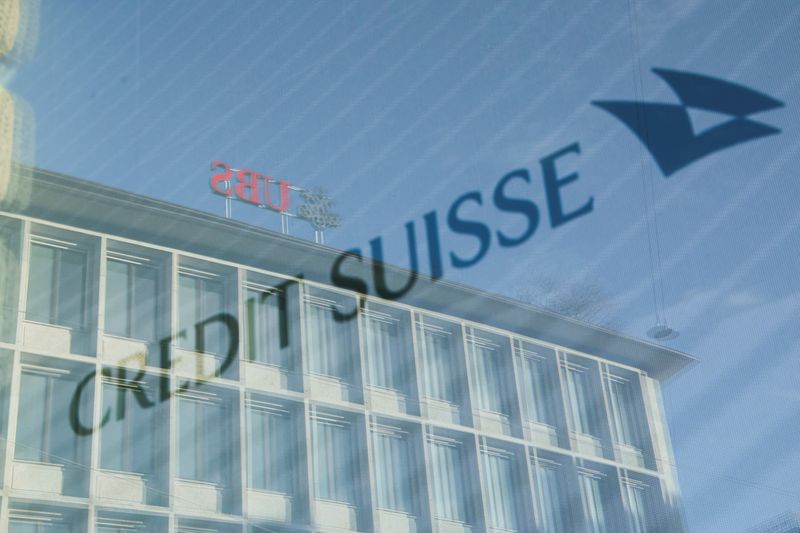LONDON (Reuters) - Just over $17 billion worth of Credit Suisse (SIX:CSGN) bonds, known as Additional Tier 1 or AT1, debt will be written down to zero on the orders of the Swiss regulator as part of a rescue merger with UBS.
Under the deal, holders of Credit Suisse AT1 bonds will get nothing, while shareholders, who usually rank below bondholders in terms of who gets paid when a bank or company collapses, will receive $3.23 billion.
AT1 bonds issued by other European banks fell sharply on Monday as the treatment of Credit Suisse AT1 bondholders highlighted the risks of investing in this type of debt.
Here are some of the implications of the Credit Suisse AT1 bond write-down.
WHAT IS AN AT1 BOND?
AT1 bonds - a $275 billion sector also known as "contingent convertibles" or "CoCo" bonds - act as shock absorbers if a bank's capital levels fall below a certain threshold. They can be converted into equity or written off.
They make up part of the capital cushion that regulators require banks to hold to provide support in times of market turmoil.
They are the riskiest type of bond a bank can issue and so carry a higher coupon.
If AT1s are converted into equity, this supports a bank's balance sheet and helps it to stay afloat. They also pave the way for a "bail-in", or a way for banks to transfer risks to investors and away from taxpayers if they get into trouble.
WHAT HAPPENED TO CREDIT SUISSE AT1S?
AT1s rank higher than shares in the capital structure of a bank. If a bank runs into trouble, bondholders will rank above shareholders in terms of getting their money back.
In Switzerland, the bonds' terms state, however, that in a restructuring, the financial watchdog is under no obligation to adhere to the traditional capital structure, which is how bondholders lost out in the Credit Suisse situation.
Credit Suisse AT1 holders, therefore, are the only ones not to receive any kind of compensation. Under the rescue deal, they rank lower than shareholders in the bank, who can at least get UBS' takeover price of 0.76 Swiss francs ($0.8191) per share.
WHO RANKS HIGHER?
European regulators said on Monday they would continue to impose losses on shareholders before bondholders - unlike the treatment of bondholders at Credit Suisse.
Separately, the Bank of England also said that Britain had a clear statutory order in which shareholders and creditors of failed banks bear losses, with AT1 instruments ranking ahead of other equity instruments and behind tier two bonds in the hierarchy.
It is not the first time that the treatment of AT1 bonds in a bank overhaul has caused controversy. A dispute over the write-off of around $1 billion of AT1 bonds issued by India's Yes Bank in March 2020 after the Reserve Bank of India initiated a restructuring of the lender is currently subject to court proceedings.
WHAT DOES IT MEAN FOR INVESTORS?
Fixed income investors were shocked by the Swiss regulator's decision to make Credit Suisse write down its AT1 debt to zero. But if they had read the fine print in the bond prospectus, they would not have been.
One bank adviser and a bond investor said the Swiss government's actions were legal since the type of AT1 bonds issued by Credit Suisse could be subject to a complete write- down.
But the price of other banks' AT1 bonds have dropped as investors have panicked, fearing their bonds, which were meant to provide more protection than shares, could face the same fate.
WHAT DOES IT MEAN FOR THE BROADER MARKET?
The decision to write down Credit Suisse AT1 bonds to zero is viewed as negative for the AT1 bond market globally.

Analysts reckon investors will be much more cautious about buying AT1 bonds in the future, making it tougher for banks which need to raise money in bond markets to meet regulatory requirements.
Bid prices on AT1 bonds from banks, including Deutsche Bank (ETR:DBKGn), HSBC (LON:HSBA), UBS and BNP Paribas (EPA:BNPP) dropped 9-12 points on Monday, sending yields sharply higher, data from Tradeweb showed.